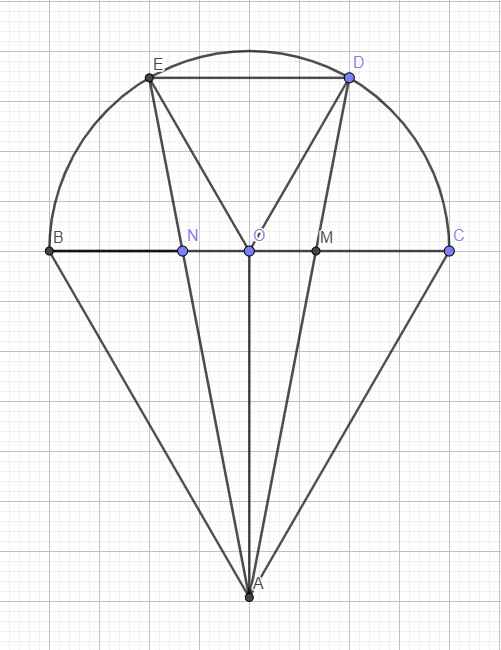
Hãy nhập câu hỏi của bạn vào đây, nếu là tài khoản VIP, bạn sẽ được ưu tiên trả lời.


Gọi O là tâm đường tròn \(\Rightarrow\) O là trung điểm BC
\(\stackrel\frown{BE}=\stackrel\frown{ED}=\stackrel\frown{DC}\Rightarrow\widehat{BOE}=\widehat{EOD}=\widehat{DOC}=\dfrac{180^0}{3}=60^0\)
Mà \(OD=OE=R\Rightarrow\Delta ODE\) đều
\(\Rightarrow ED=R\)
\(BN=NM=MC=\dfrac{2R}{3}\Rightarrow\dfrac{NM}{ED}=\dfrac{2}{3}\)
\(\stackrel\frown{BE}=\stackrel\frown{DC}\Rightarrow ED||BC\)
Áp dụng định lý talet:
\(\dfrac{AN}{AE}=\dfrac{MN}{ED}=\dfrac{2}{3}\Rightarrow\dfrac{EN}{AN}=\dfrac{1}{2}\)
\(\dfrac{ON}{BN}=\dfrac{OB-BN}{BN}=\dfrac{R-\dfrac{2R}{3}}{\dfrac{2R}{3}}=\dfrac{1}{2}\)
\(\Rightarrow\dfrac{EN}{AN}=\dfrac{ON}{BN}=\dfrac{1}{2}\) và \(\widehat{ENO}=\widehat{ANB}\) (đối đỉnh)
\(\Rightarrow\Delta ENO\sim ANB\left(c.g.c\right)\)
\(\Rightarrow\widehat{NBA}=\widehat{NOE}=60^0\)
Hoàn toàn tương tự, ta có \(\Delta MDO\sim\Delta MAC\Rightarrow\widehat{MCA}=\widehat{MOD}=60^0\)
\(\Rightarrow\Delta ABC\) đều




c)\(\sqrt{4-\sqrt{7}}-\sqrt{4+\sqrt{7}}\)
=\(\dfrac{\sqrt{8-2\sqrt{7}}}{\sqrt{2}}-\dfrac{\sqrt{8+2\sqrt{7}}}{\sqrt{2}}\)
=\(\dfrac{\sqrt{\left(\sqrt{7}-1\right)^2}}{\sqrt{2}}-\dfrac{\sqrt{\left(\sqrt{7}+1\right)^2}}{\sqrt{2}}\)
=\(\dfrac{\left|\sqrt{7}-1\right|-\left|\sqrt{7}+1\right|}{\sqrt{2}}\)
=\(\dfrac{\sqrt{7}-1-\sqrt{7}-1}{\sqrt{2}}\)
=\(\dfrac{-2}{\sqrt{2}}\)
=\(-\sqrt{2}\)

a, sinC = \(\frac{AB}{BC}\); tanC = \(\frac{AB}{AC}\)
cosC = \(\frac{AC}{BC}\); cotC = \(\frac{AC}{AB}\)
b, Xét tam giác ABC vuông tại A, đường cao AH
tanB = \(\frac{AC}{AB}=\sqrt{2}\Rightarrow AC=\sqrt{2}AB\)
* Áp dụng hệ thức : \(\frac{1}{AH^2}=\frac{1}{AB^2}+\frac{1}{AC^2}\Rightarrow\frac{1}{12}=\frac{1}{AB^2}+\frac{1}{2AB^2}\Rightarrow AB\approx4,24\)cm
\(\Rightarrow AC\approx4,24\sqrt{2}\)cm
Theo định lí Pytago tam giác ABC vuông tại A
\(BC=\sqrt{AB^2+AC^2}\approx\sqrt{4,24^2+\left(4,24\sqrt{2}\right)^2}\approx7,34\)cm


Bài 4:
a)
\(M=x+\sqrt{2-x}=-\left(2-x\right)+\sqrt{2-x}+2\)
Đặt \(\sqrt{2-x}=m\left(m\ge0\right)\)
\(\Rightarrow M=-m^2+m+2\)
\(=-\left(m^2-m+\dfrac{1}{4}\right)+\dfrac{1}{4}+2\)
\(=\dfrac{9}{4}-\left(m-\dfrac{1}{2}\right)^2\le\dfrac{9}{4}\)
Dấu "=" xảy ra khi \(m=\dfrac{1}{2}\Leftrightarrow\sqrt{2-x}=\dfrac{1}{2}\Leftrightarrow x=\dfrac{7}{4}\)
b)
\(5x^2+9y^2-12xy+8=24\left(2y-x-3\right)\)
\(\Leftrightarrow5x^2+24x+9y^2-48y-12xy+80=0\)
\(\Leftrightarrow\left(4x^2+9y^2+64-12xy-48y+32x\right)+\left(x^2-8x+16\right)=0\)
\(\Leftrightarrow\left(2x-3y+8\right)^2+\left(x-4\right)^2=0\)
\(\Leftrightarrow\left\{{}\begin{matrix}x=4\\y=\dfrac{16}{3}\end{matrix}\right.\) (loại)
Vậy . . .
Bài 2:
a)
\(M=\dfrac{x^5}{30}-\dfrac{x^3}{6}+\dfrac{2x}{15}\)
\(=\dfrac{x^5-5x^3+4x}{30}\)
\(=\dfrac{x\left(x^4-5x^2+4\right)}{30}\)
\(=\dfrac{x\left(x^2-4\right)\left(x^2-1\right)}{30}\)
\(=\dfrac{x\left(x-2\right)\left(x-1\right)\left(x+1\right)\left(x+2\right)}{30}\)
Suy ra nếu x nguyên thì M cũng nguyên ^.^
Bài 3:
a) Chứng minh \(VP\ge VT\) dùng Cauchy Shwarz dạng Engel.
b) Xét \(M=2a^2+2b^2+2\)
\(=\left(a^2+1\right)+\left(b^2+1\right)+\left(a^2+b^2\right)\)
\(\ge2a+2b+2ab\) (áp dụng bđt AM - GM)
\(\Rightarrow a^2+b^2+1\ge a+b+ab\left(\text{đ}pcm\right)\)

1. a) Ta có :A=99...9000...0+25(n chữ số 9,n +2 chữ số 0)
Đặt a=11...1(n chữ số 1 ) suy ra : 10n=9a+1.Khi đó :
A=9a.(9a+1).100+25=8100a2+900a+25=(90a+5)2=99...952
2.a)
Ta có :A=11...1\(\times\)10n+11...1-22...2(n chữ số 1 ,n chữ số 2)
Đặt a=11...1 (n chữ số 1) suy ra 10n=9a+1,22...2=2a.Khi đó :
A=(a(9a+1)+a)-2a=9a2=(3a)2=33...32(n chữ số 3)
b)Tương tự :B=a(9a+1)+a+4a+1=9a2+6a+1=(3a+1)2=33..342(n -1 chữ số 3)











a: Ta có: \(P=1+\dfrac{x+3}{x^2+5x+6}:\left(\dfrac{8x^2}{4x^3-8x^2}-\dfrac{3x}{3x^2-12}-\dfrac{1}{x+2}\right)\)
\(=1+\dfrac{1}{x+2}:\left(\dfrac{8x^2}{4x^2\left(x-2\right)}-\dfrac{3x}{3\left(x-2\right)\left(x+2\right)}-\dfrac{1}{x+2}\right)\)
\(=1+\dfrac{1}{x+2}:\left(\dfrac{2}{x-2}-\dfrac{x}{\left(x-2\right)\left(x+2\right)}-\dfrac{1}{x+2}\right)\)
\(=1+\dfrac{1}{x+2}:\left(\dfrac{2x+4-x-x+2}{\left(x-2\right)\left(x+2\right)}\right)\)
\(=1+\dfrac{1}{x+2}\cdot\dfrac{\left(x-2\right)\left(x+2\right)}{6}\)
\(=1+\dfrac{x-2}{6}\)
\(=\dfrac{x+4}{6}\)